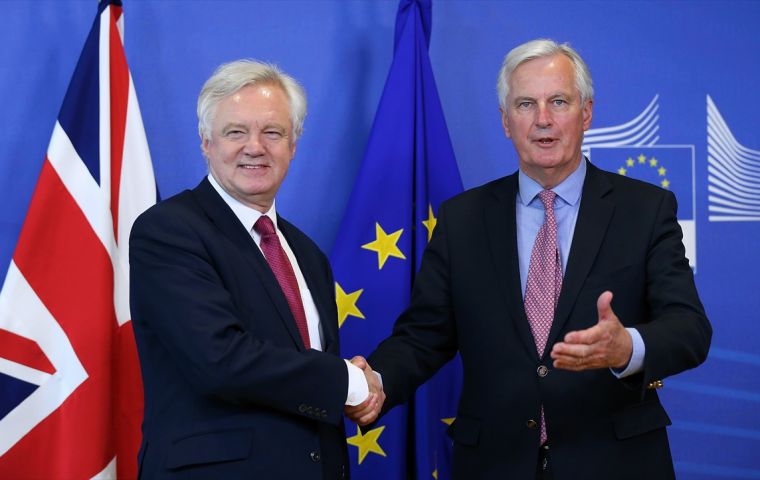MercoPress. South Atlantic News Agency
UK could consider an extension of Brexit talks if Parliament rejects withdrawal deal
 Davis pointed out that all EU member states would have to give their approval before the Article 50 process could be extended.
Davis pointed out that all EU member states would have to give their approval before the Article 50 process could be extended. Brexit Secretary David Davis has suggested the UK government could consider asking for Brexit negotiations to be extended if Parliament votes down the withdrawal deal later this year. Speaking to the Exiting the EU Committee on Wednesday, Davis conceded that it would not be impossible to prolong Article 50 negotiations, having previously said that the deal would “fall” if MPs vote it down.
Labour MP Pat McFadden asked Davis whether there would be any circumstances where the government would go back to Brussels to negotiate a revised Brexit deal if Parliament decides to vote it down later this year.
“What I'm trying to drive at, is whether there are any circumstances in which you'd go back to the EU on certain points, for example, if the resolution were amended to say Parliament would like the government to seek an extension of the Article 50 process — is that possible?” McFadden asked Davis this morning.
“Or is the government's position that if you vote against this in any way, the whole thing falls and we leave without a deal?”
Davis pointed out that all EU member states would have to give their approval before the Article 50 process could be extended.
“That requires unanimity between us and the EU27 altogether. If Parliament asks for something impossible, obviously we cannot deliver on it,” he told McFadden.
The Labour MP then put to Davis that extending negotiations is not “impossible” — as the Brexit Secretary had suggested — because the EU27 could agree to it.
“Of course it's not just down to the government, but Parliament can request our government. And it's not impossible, it's that it's not solely the government — those are two different things aren't they?” McFadden said.
“The rules are clear. With unanimity, it can be extended,” Davis replied.
Davis appeared in front of the Hilary Benn-led Brexit committee as the UK government attempts to find a workable solution to the Irish border dilemma, which is threatening to prevent both sides from reaching a deal.
By extending Article 50 negotiations, the UK government would, in theory, give itself more time to resolve issues like how to preserve the invisible border on the island of Ireland.
Prime Minister Theresa May has repeatedly rebuffed talk of delaying Britain's exit date, insisting that it will definitely leave the EU in March, 2019.
Davis on Wednesday admitted that it is possible for the government to go back to the negotiating table to avoid a no-deal Brexit, which experts say would severely damage Britain's economy and unleash unprecedented political instability.




Top Comments
Disclaimer & comment rulesCommenting for this story is now closed.
If you have a Facebook account, become a fan and comment on our Facebook Page!